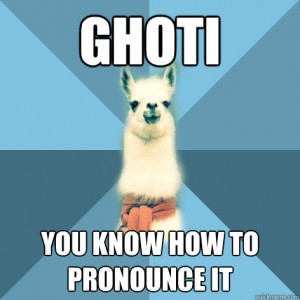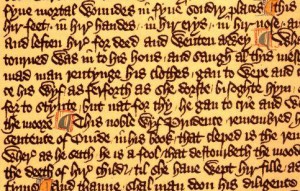Does that title make you as happy as it makes me? Probably not, but let’s see if I can change that.
 Linguistics Llama Knows What I’m Saying
Linguistics Llama Knows What I’m Saying
Part 1: Ghoti is a satirical spelling of fish [fɪʃ]. It is often attributed to George Bernard Shaw, but he doesn’t take credit for it. Ghoti is used to mock spelling inconsistencies in English and advocate reform. (There’s a clever bunch who even say ghoti should be silent). I don’t deny it, English spelling is very irregular. It’s a Germanic language at heart, but with massive word-borrowing from French and Latin, and PTSD from the GVS (Great Vowel Shift). This is the phonetic thinking behind ghoti:
GH is [f] as in TOUGH
O is [ɪ] as in WOMEN
TI is [ʃ] as in NATION
Obviously, the ‘sh’ in nation needs a larger environment to have its unusual pronunciation, as in ghotion. Likewise, ‘gh’ in tough needs to be syllable-final, as in roughotion [rʌfɪʃən]. That works, I guess, except for that tricky vowel. That silly vowel that makes people say WOAH-man.
Part 2: Today, morphology homework (<3) had me reading some chapters about the history of English. Oh my, what a happy girl. Spelling changes in English have happened accidentally and on purpose, and both kinds of change contribute to confusion about spelling and pronunciation in the modern age. (Travel to the near future and read my article about DAR and thorn for another example. )
One such source of change are minims. “What are minims?!” you ask, impatiently. Well, back in the day of illuminated texts, scribes used to write in very elaborate script, and they used sequences of vertical downstrokes to signify 6 letters: i, m, n, u, v, and w. These letters were indistinguishable from each other. This means that a word like man would sort of look like this: ɪɪɪaɪɪ, and would look the same as wav, inan, maii, viau. For man this is not a problem, because it’s a common word with no potential homographs, but for several words it was. In those cases, the vowel, i or u, was changed to an o for legibility’s sake. Some were never changed back. Originally come was cume, love was luve, and woman, was wimman. They originals would have looked like this cɪɪɪɪɪe, lɪɪɪɪe, and ɪɪɪɪɪɪɪɪɪɪaɪɪ.
 Minims in an Excerpt of Canterbury Tales
Minims in an Excerpt of Canterbury Tales
Even though an o was used in manuscripts, it was understood that the pronunciation was still the same. At some point, from second-language learners or a lag in education, this knowledge was forgotten or lost or ignored. So! The o’s in woman and women are placeholders for i. The first vowel in woman [wʊmən] became rounded from the [w]. The plural of wimman was wimmen, which was influenced by its second vowel and retained the original sound as [wɪmɪn] That’s why it’s written that way. Yeah! Mystery solved!
Part 3: Gloria Steinem is often quoted as saying “A woman needs a man like a fish needs a bicycle.” Very often, I confuse Gloria Steinem with Gertrude Stein in my head. Influential ladies with similar names. Anyway, apparently Gloria didn’t originate the quote, Irina Dunn did. (100% failure of common knowledge about quotes today, team). Anyway, it’s a great quote, I love it, and it conveniently combines this fact that I just learned about minims and the persnickety old standby, ghoti.
“A wimman needs a man like a ghoti needs a bicycle.”
Happy half-birthday to me.
January 24, 2012
{ 1 comment… read it below or add one }
happy un-birthday to U, happy un-birthday 2 U, happy un-birthday
Miss Bri-annnnnnnnnnnnnnn-n, happy MirthDay 2 U!
I never keep track, glad someone is.